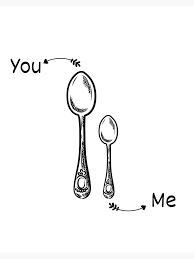
Introduction :
Are you ready to take a Little Spoon? I am not Joking folks. Read ahead, to understand the niche. In the world of nutrition and health, we often encounter terms that sound like they belong in a culinary dictionary. One such word that has been gaining attention recently is “little Spoon”. But what does it actually mean, and how does it relate to our well-being? In this blog post, we’ll take a deeper look at the concept of Little Spoons, explore its health effects, and answer some frequently asked questions to shed light on this interesting topic.
What is a Little Spoon?
The term “Little Spoon” has its roots in the practice of mindful eating, a holistic approach that encourages individuals to pay close attention to the sensory experience of eating. The Little Spoon is not an actual utensil, but a metaphorical tool that represents a more deliberate and conscious way of consuming food. Unlike its counterpart, the big spoon – which is characterized by mindless and hasty eating – the little spoon promotes a slower, more deliberate approach to food.
Health Benefits of Embracing the Little Spoon
Better digestion:
When we eat too frequently, our digestive system may struggle to keep up with the flow of food. The Small Spoon approach allows for better digestion, as it gives the digestive enzymes in our saliva more time to break down the food before it reaches the stomach. It can reduce common digestive problems like bloating and indigestion.
Enhanced Nutrient Absorption:
Eating slowly with a small spoon enables the body to absorb nutrients more efficiently. Chewing food thoroughly and savoring each piece results in better absorption of nutrients into the digestive system. This may increase the absorption of essential vitamins and minerals, contributing to overall better health.
Weight Management:
Adopting the Little Spoon technique may help with weight management by promoting a feeling of satiety and satisfaction. When we eat slowly and pay attention to our body’s signals, we’re more likely to recognize when we’re truly full, preventing overeating and unnecessary weight gain.
Mind-Body Connection:
The spoon promotes a stronger mind-body connection by encouraging individuals to be present during meals. By focusing on the taste, texture, and aroma of food, we become more attuned to our body’s hunger and satiety signals. This mindfulness can extend beyond mealtime, and positively impact our overall approach to nutrition and wellness.
Reduction in stress and anxiety:
Eating in a hurry can cause stress and anxiety, as our body reacts to the urgency of the situation. Adopting a small spoon mentality promotes a more comfortable and enjoyable dining experience, reduces stress levels and contributes to a healthy mental state.
Frequently Asked Questions (FAQ)
1. Question: Is this Technique suitable for everyone?
Answer: Yes, the Little Spoon approach to eating is suitable for individuals of all ages and backgrounds. It may be especially beneficial for people who want to improve their digestion, control their weight, and develop a healthy relationship with food.
2. Question: How can I start incorporating this Technique into my diet?
Answer: Start by setting aside a dedicated time for your meals, free from distractions. Pay attention to each piece, savor the flavor and texture. Chew your food thoroughly and put down your utensils between meals for a slower, more deliberate pace.
3. Question: Can this technique help with portion control?
Answer: Yes, practicing mindful eating with a small spoon can help with portion control. By paying attention to your body’s signals of hunger and fullness, you’re less likely to overeat. This may be especially beneficial for people who aim to lose or control weight.
4. Question: Does thisn Technique require any specific diet or meal plan?
Answer: No, the Little Spoon technique is not linked to any specific diet or eating plan. It’s a conscious approach to eating that can complement different dietary preferences and lifestyles. Whether you follow a plant-based diet, keto, or any other eating style, incorporating a small spoon mentality can improve your overall well-being.
5. Question: Can the Little Spoon technique help with digestive problems?
Answer: Yes, adopting the Little Spoon technique can improve digestion. By eating slowly and chewing your food thoroughly, you allow your digestive system to work more effectively. It may be especially helpful for individuals who experience problems such as bloating, indigestion or acid reflux.
conclusion





Your point of view caught my eye and was very interesting. Thanks. I have a question for you.
Your point of view caught my eye and was very interesting. Thanks. I have a question for you.
Thanks for sharing. I read many of your blog posts, cool, your blog is very good.